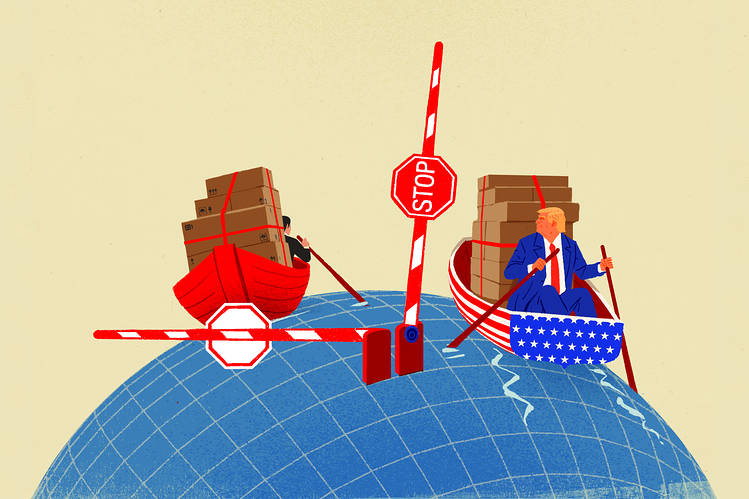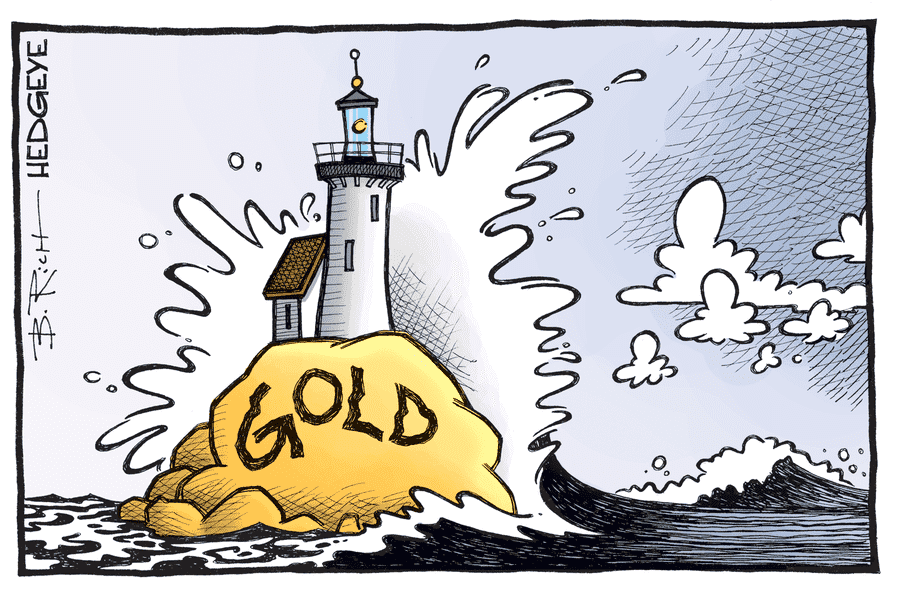
In the world of finance, we always struggle to view the global economic picture in a truly “holistic” way. We are much better at focusing on a few key points while neglecting most of the rest. Often, our attention is on employment, inflation, and economic growth. That has been our main concern for months.
But right now, we have found a new obsession, a new battle horse that has managed to overshadow everything else. Yes, you guessed it—since the inauguration, Donald Trump’s new dance partner, TARIFFS, has taken center stage. And yesterday, it got even worse.
Inflation Adjustment
I’m going to ask you for something superhuman as an investor: try to remember the past five years. COVID, monetary injections, government support, then the onset of inflation. Inflation that was under control and temporary. Oh wait, no—not temporary and not under control at all. So, we need to raise interest rates—AND FAST—to slow it down. Eventually, it works, but employment and economic growth seem to start feeling the consequences.
And then Trump gets elected. He arrives at the White House while our main concerns are the CPI—which refuses to drop—the PPI—which is doing the same—and the labor market, which has been struggling for months, with numbers constantly being revised downward, seemingly calculated with a children’s abacus at the Bureau of Labor Statistics. And let’s not forget the PCE, THE FED’S FAVORITE MEASURE FOR ASSESSING INFLATION.
For nearly a year, we’ve been living week by week, moving forward step by step, from one economic figure that is supposed to change everything to another economic figure that is supposed to change things even more than the last one that was already supposed to change everything. And all this while waiting for the NEXT economic figure that will REALLY be the one to determine the fate of the U.S. economy. And, by extension, the rest of the world.
Let’s be honest—you know I’m right. And then, during the U.S. elections, we asked ourselves about tariffs—tariffs that could increase overall prices and give inflation another boost. We wondered whether cutting taxes to stimulate the economy might also have an inflationary effect. And to each of these questions, the market and experts brushed them off, saying, “NO, NO, that shouldn’t have that much of an impact.”
Yet, for the past two weeks, we’ve started to ADMIT that, yes, tariffs could end up having a real impact on inflation. Because, as crazy as it sounds, if a company faces higher raw material costs due to tariffs, it might pass those costs onto consumers. It could also reduce its margins and make less money to ease the burden on consumers. That’s a fact. But at the same time, that’s not exactly in their best interest—because, well, money.
Disinterest
All this to say that we’ve been living in an inflationary world for five years. And while rate hikes have helped slow inflation somewhat, real prices have increased by nearly 30% over that period. But not your salary. Not your income. Not your company’s performance—at least, not for most people. Inflation and our battle against it are truly important and should be our top concern. Just like today’s PCE report.
See where I’m going with this? No? Well, then let me continue.
This afternoon, the PCE report will be released, and under normal circumstances—I mean, REALLY NORMAL, with three extra “A’s” and four extra “L’s”—this number should be on everyone’s radar, especially in the wonderful world of finance.
But apparently—if you read the media—no one gives a damn anymore, because EVERYONE, without exception, is obsessing only about the tariffs set to be announced on April 2, the so-called “Liberation Day.” You know, those RECIPROCITY TARIFFS meant to put every country on equal footing with America, which is about to become GREAT AGAIN.
Curiously, that’s the only thing anyone cares about now. And yet, given Trump’s ability to change his mind, flip-flop, double down before flip-flopping again, and then change his mind once more, betting everything on April 2’s tariff announcements being final and non-negotiable seems completely utopian, wouldn’t you agree? In fact, more than just utopian—it would be stupid to believe this is where it ends.
The Decision-Making Skills of a Rotten Mussel
And yet, when you take the time to read and listen to what’s being said about the markets, no one talks about inflation anymore. No one talks about economic growth. No one even dares to mention the slowing job market. Of course not—because we’re too busy analyzing the potential impact of tariffs that might be announced on April 2, that might be final, but that might also be complete nonsense and change 212 times before they’re actually implemented.
We all know this. You know it. The bankers know it. The politicians know it. Even Donald Trump knows it.
And yet, despite all that, we’re obsessing over something that might happen—with consequences that are difficult to predict—while completely ignoring the numbers that have haunted our nights for the past five years.
This morning, I read MarketWatch, Barron’s, Investing.com, Zonebourse. I spent time on Bloomberg, CNBC, even the Financial Times. I was all over X.
And what is everyone talking about?

Recalibrating Inflation
I’m going to ask you for a superhuman effort as an investor: try to remember the last five years. COVID, monetary injections, government support, then the onset of inflation. An inflation that was under control and transitory. Oh no, wait—not transitory and not under control at all. So, we had to raise interest rates—AND FAST—to slow down this inflation. Eventually, it worked, but employment and growth started to feel the consequences. And then Trump got elected. He arrives at the White House while our main concerns are the CPI—which refuses to drop—the PPI—which does the same—and the labor market, which has been struggling for months, with figures constantly revised downward and seemingly calculated with a child’s abacus at the Bureau of Labor Statistics. And then there’s the PCE, which is THE FED’S FAVORITE MEASURE FOR ASSESSING INFLATION.
For nearly a year, we’ve been going week by week, day by day, moving from one economic figure that’s supposed to change everything to another economic figure that’s supposed to change everything even more than the previous one. And all this while waiting for the NEXT economic figure that will REALLY be the game-changer for the U.S. economy—and, by extension, the rest of the world.
Let’s not kid ourselves—you know I’m right. And during the U.S. elections, we even asked ourselves about “tariffs” that could drive prices up globally and give inflation a fresh boost. We wondered whether cutting taxes to stimulate the economy might have an inflationary effect. And for each of these concerns, the market and the so-called experts brushed them aside, saying, “NO, NO, it shouldn’t have that much of an impact.” And yet, for about two weeks now, we’ve begun to ADMIT that, yes, tariffs could indeed have a real impact on inflation. Because, as crazy as it sounds, if a company has to deal with the rising cost of raw materials subject to tariffs, it might—just might—pass those costs on to consumers. Or, sure, they could absorb the cost, lower their margins, and make less money for the sake of the consumer. That’s a possibility. But at the same time, that’s not exactly in their best interest, is it?
Lack of Interest
All this to say that we’ve been living in an inflationary world for five years. And even though rate hikes have helped slow inflation somewhat, real prices have increased by nearly 30% over five years. But not your salary. Not your income. And not your company’s performance—at least not for the majority. The battle against inflation is crucial and should be one of our biggest concerns. Just like today’s PCE report.
See where I’m going with this? No? Okay, let me continue. This afternoon, the PCE report will be released, and under NORMAL circumstances—I mean REALLY NORMAL, with three extra “A’s” in “normal” and four extra “L’s”—this figure should have everyone’s attention, especially the financial world’s so-called experts.
But apparently—judging by the media and financial press—no one gives a damn. EVERYONE, without exception, is focused SOLELY and EXCLUSIVELY on the upcoming tariff announcements on Liberation Day, April 2. You know, those RECIPROCITY TARIFFS that are supposed to level the playing field for all countries and make America GREAT AGAIN. Strangely, that’s all anyone cares about. And yet, knowing Trump’s ability to change his mind, flip-flop, double down, and flip-flop again, betting everything on the assumption that the tariffs announced on April 2 will be final seems like pure fantasy.
Actually, “pure fantasy” isn’t strong enough—it would be downright idiotic to believe this is “where it stops.”
The Critical Thinking Skills of a Rotten Mussel
Yet, if you take the time to read and listen to what’s being said about the financial markets, no one is talking about inflation anymore. No one is talking about economic growth. We don’t even dare mention the slowing job market. No, of course not—because we’re too busy analyzing the IMPACT THAT TARIFFS MIGHT HAVE, IF they are announced on April 2, IF they are final, IF they even happen at all.
And, let’s be real, we all know this. You know it. Bankers know it. Politicians know it. Even Donald Trump knows it. But despite all this, everyone is fixated on a hypothetical scenario with consequences that are still unclear, allowing us to completely ignore the numbers that have been haunting us for five years.
This morning, I read MarketWatch. I read Barron’s. I checked Investing.com. I went on ZoneBourse. I spent time on Bloomberg, CNBC, even the FT. I was all over X (formerly Twitter). And what are people talking about?
Yes, You Guessed It: Tariffs
I didn’t see a single mention of inflation, the PCE report coming out later today, or even the job numbers coming next Friday—AFTER LIBERATION DAY. The only topic is tariffs.
Yesterday, the focus was on auto tariffs, which momentarily became the most important issue in the world. People have even gone so far as to break down how many cars each brand produces abroad to measure the impact:
Ford manufactures about 80% of the cars it sells in the U.S., in the U.S., making it the least affected.
Honda is at 65%.
GM and Stellantis are at 55%.
Toyota and BMW are about 50-50.
Mercedes drops to 40%.
Hyundai and KIA? 65% of their cars come from abroad.
Volkswagen, Audi, and Porsche? 80%.
And the big winner? Tesla, of course—100% of its U.S. sales come from U.S. manufacturing. Just a coincidence, I’m sure. Draw your own conclusions.
So if you were wondering why the market was down yesterday—this is it.
And judging by all the commentary floating around, this is THE ONLY REASON, because, right now, NOTHING ELSE MATTERS. Investors have become single-minded when making decisions. Nothing else exists.
The Logical Consequence
Japan is down 2% this morning? Tariffs.
Oil flirting with $70? Tariffs again.
Gold above $3,100 and Bitcoin at $86,500? Tariffs.
The Shanghai and Hong Kong markets are struggling? Tariffs.
The underperformance of semiconductor stocks and the Magnificent Seven? Tariffs.
Everything comes back to tariffs. Nothing else matters. For now. Until April 3. When the tariffs will be announced, confirmed, validated, and make America Great Again. Or maybe on April 5. Or maybe on April 7. Or maybe on April 7, 2026…
And if you had any doubts—just check out the transaction volumes. European investors have been pulling out of U.S. funds en masse in recent weeks. Meanwhile, over the past few days, with volatility dropping below 19%, more and more American investors have been buying short-term options to “play the post-Liberation Day market.” They’re betting big on the indices and the Magnificent Seven. The only question now is which direction to bet.
As an analyst in the U.S. put it last night:
“Tariffs will either be extremely well received by the market, or they will be extremely BADLY received by the market.”
There will be no middle ground. Right now, we’re hyping ourselves up, convinced that there will be a BEFORE April 2 and an AFTER April 2. It’s a certainty. Or at least, a NEAR certainty. Though, to be fair, we’ve used the phrase “there will be a before and after” about 850 times since we realized COVID had nothing to do with pangolins.
We’ve said this for every CPI report, every PCE report, every Jobless Claims report, sometimes even the JOLTS report, and definitely for Nvidia’s earnings the past four quarters.
But THIS TIME, it’s FOR REAL.
It’s completely ridiculous to say, but here we are.
In Conclusion
It’s Friday. The PCE report drops in a few hours, but no one cares—because, you see, “it’s all about the tariffs.”
So have a great weekend! See you Monday—to talk about tariffs, Trump, and maybe, just maybe, today’s PCE report. But no promises.
See you Monday!

